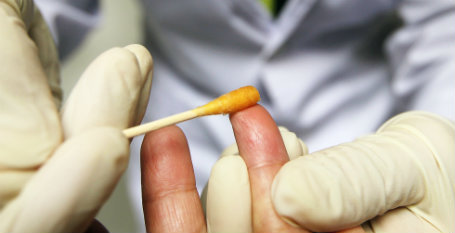Gay men in their 20s were the most affected group of people with HIV last year in Hong Kong, according to recentgovernment statistics.
The age group of those between 20 and 29 years saw 164 new people with HIV last year, compared to those aged 30 to 39 that saw only 102 new cases in the same period, Health Department figures issued Feb 23 showed, according to a report by the South China Morning Post.
It said 378 of the 651 new cases reported in 2014 were via sex between men and that in the last three months of 2014 along Hong Kong saw 152 new cases, 125 of which occurred in men. Of those, 82 were acquired via gay or bisexual sex.
"The trend [of a younger infected population] is worrisome … the situation will only get worse for them. With more people infected in the community, the chance of getting infected also increases," Dr Wong Ka-hing, consultant at the Health Department told the newspaper.
He said young people's knowledge of HIV/AIDS had declined and that judging from inputs from social workers, they seemed less aware than before about protection measures.
An earlier health department survey revealed that only 70 per cent of gay men used a condom during sex.
"Obviously, I don't think current prevention [measures] have been successful," Wong told the South China Morning Post.
Since the first HIV case was detected in 1985, Hong Kong has recorded 6,993 such cases, with 1,545 developing into AIDS, it reported.
Wong said that gay men making up the biggest group of new patients was in line with international trends.
Officials from the AIDS Concern voluntary group have already pointed out that the number of young HIV patients was partly due to deficiencies in sex education and the anti-gay stigma and discrimination that kept a lot of young gay or bisexual men from getting tested for fear of exposing their sexual orientation.
Without treatment, about half of those who contract HIV will go on to develop life threatening AIDS within 10 years. Receiving treatment reduces the possibility of developing AIDS by 90 per cent.
In socially conservative Hong Kong, same-sex relations was only decriminalized in 1991 and same-sex marriages and civil partnerships are as yet illegal. Discrimination on the basis of sexual orientation is not banned in Hong Kong and much of society remains opposed to equal laws for same-sex couples.
Gay men in their 20s were the most affected group of people with HIV last year in Hong Kong, according to recentgovernment statistics.
The age group of those between 20 and 29 years saw 164 new people with HIV last year, compared to those aged 30 to 39 that saw only 102 new cases in the same period, Health Department figures issued Feb 23 showed, according to a report by the South China Morning Post.
It said 378 of the 651 new cases reported in 2014 were via sex between men and that in the last three months of 2014 along Hong Kong saw 152 new cases, 125 of which occurred in men. Of those, 82 were acquired via gay or bisexual sex.
"The trend [of a younger infected population] is worrisome … the situation will only get worse for them. With more people infected in the community, the chance of getting infected also increases," Dr Wong Ka-hing, consultant at the Health Department told the newspaper.
He said young people's knowledge of HIV/AIDS had declined and that judging from inputs from social workers, they seemed less aware than before about protection measures.
An earlier health department survey revealed that only 70 per cent of gay men used a condom during sex.
"Obviously, I don't think current prevention [measures] have been successful," Wong told the South China Morning Post. Since the first HIV case was detected in 1985, Hong Kong has recorded 6,993 such cases, with 1,545 developing into AIDS, it reported.
Wong said that gay men making up the biggest group of new patients was in line with international trends.
Officials from the AIDS Concern voluntary group have already pointed out that the number of young HIV patients was partly due to deficiencies in sex education and the anti-gay stigma and discrimination that kept a lot of young gay or bisexual men from getting tested for fear of exposing their sexual orientation.
Without treatment, about half of those who contract HIV will go on to develop life threatening AIDS within 10 years. Receiving treatment reduces the possibility of developing AIDS by 90 per cent.
In socially conservative Hong Kong, same-sex relations was only decriminalized in 1991 and same-sex marriages and civil partnerships are as yet illegal. Discrimination on the basis of sexual orientation is not banned in Hong Kong and much of society remains opposed to equal laws for same-sex couples.

